American policy planners for Afghanistan would do well to take note of developments in Egypt, where last week the army deployed in Cairo to fill the vacuum created by the disappearance of the hated police. To my mind, there’s a clear parallel with Afghanistan, where the notoriously corrupt police are likewise hated, while the army enjoys a similar — if not as historically established — reputation as the Egyptian military. But the difficulty in Egypt in finding an acceptable transition scenario to the current unrest suggests the limitations of a society in which the military is the only credible institution […]
Global Archive
Free Newsletter
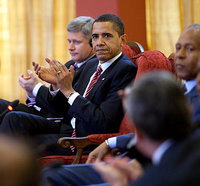
Ian Bremmer and David Gordon, of the Eurasia Group, do not sugar-coat the shape of the new world order emerging in the 21st century. They starkly note: For the first time since the end of World War II, no country or bloc of countries has the political and economic leverage to drive an international agenda. The United States will continue to be the only truly global power, but it increasingly lacks the resources and domestic political capital to act as primary provider of global public goods. There are no ready alternatives to U.S. leadership. They dub this international order “G-zero,” […]

In the background of Chinese President Hu Jintao’s recent visit to the United States was the specter of increased military tensions between China and the U.S. Chinese military capabilities appear to be growing rapidly, with systems like the J-20 stealth fighter and the DF-21 anti-ship ballistic missile threatening key U.S. assets. However, the summit between Hu and President Barack Obama focused more on economic than military issues. And one of the foremost trade problems discussed during the visit was the issue of intellectual property (IP). The United States has consistently criticized China for laxness in IP regulation, complaining that Chinese […]
As a fundamental part of what I consider to be my parental duties, I’ve been broadening my son’s already healthy exposure to kung fu movies over the past few months. And I’m repeatedly struck by how many insights they offer into the formative folklore that animates modern-day China. Like Westerns for America, they are heavy in caricatures and historic inaccuracies. But they also reflect, at times crudely and at others quite elegantly, Chinese culture’s self-image and its view of the “other.” So as much as I found last week’s bilateral summit between Presidents Barack Obama and Hu Jintao dramatically overblown […]
California Governor Arnold Schwarzenegger recently signed an agreement with his counterparts in Acre, Brazil and Chiapas, Mexico, to cooperate on efforts to counter climate change. In an e-mail interview, Harriet Bulkeley, a professor in the Department of Geography and the Durham Energy Institute at the University of Durham, discussed subnational cooperation on climate change. WPR: How extensive is subnational cooperation on climate change? Harriet Bulkeley: Perhaps surprisingly, there is no clear answer to this question. We know that city and regional governments have cooperated in developing responses to climate change since the early 1990s, but the level and extent of […]
One thing I’d add to my remarks on France 24’s The World this Week regarding social media as tools for political protest. As I said on Friday, I’m an agnostic with regard to how decisive these emerging communication technologies are when it comes to defying authoritarian power. Certainly they facilitate information-sharing, which is one component of effective resistance. But it’s not the only component, and it’s far from the decisive one. Organizational networks, physical acts of contestation and/or the cooptation of existing centers of power — whether the police, the military or some other determinant of social order — remain […]
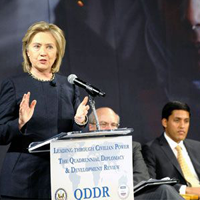
It has been depressing to watch the reaction of the American foreign-policy establishment to the Wikileaks debacle. Visceral rage has predominated, of course, but it has been mixed with a misplaced pride in the quality of State Department diplomacy. The leaks, we are told, provide reassuring evidence that all is working as it should be. Fareed Zakaria, for example, praised the insight and breadth of the analysis on offer. The cables, he wrote, are “well wrought” and reveal “clever minds” at work, with the best of them resembling something “straight out of Evelyn Waugh.” Such complacency comes as no surprise. […]
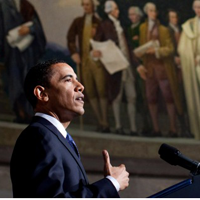
A central theme of Barack Obama’s 2008 presidential campaign was the need to revitalize the institutions of governance for 21st-century problems. “We cannot meet 21st-century challenges with a 20th-century bureaucracy,” he declared in one notable stump speech, and the sentiment was repeated throughout his campaign. Once in office, President Obama made the same claim regarding international order and governance. The 2010 National Security Strategy (NSS) (.pdf) acknowledged that in a world facing transnational threats, and one where “new centers of influence” would shape diplomatic options, international cooperation was a necessity. But it recognized that outdated institutions are as much an […]
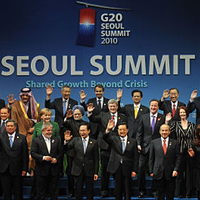
Accepting the Nobel Peace Prize in Oslo in December 2009, President Barack Obama expressed his concern that the existing global “architecture is buckling under the weight of new threats.” Part of the problem is that there is no true global-security forum. In the aftermath of the attacks of Sept. 11, Amitai Etzioni suggested that the resulting ad hoc anti-terrorism coalition might evolve into what he termed a “Global Safety Authority,” but this has not occurred. The U.N. Security Council, which according to the United Nations Charter is supposed to take up this function, has several problems. First, its membership is […]
As federal deficits rise, U.S. Defense Secretary Robert Gates is looking to cut spending by close to $100 billion in the next five years, a sign that even the Pentagon’s massive budget is subject to government-wide belt tightening. Gates discusses the new budgetary measures, his China trip and “don’t ask, don’t tell” with Jim Lehrer. A transcript of the interview can be found here.

This is Part IV in a four-part series. Part I examined the follow-up agreement to the Kyoto Protocol. Part II examined the REDD+ agreement. Part III examined financial assistance. And Part IV examines technology transfers and adaptation. CANCÚN, Mexico — In the past 10 years, technology developments in the environmental sector have progressed significantly. Solar panels now have the capacity to power entire regions of Germany. Wind turbines provide small to medium-sized cities across the world with their energy needs. Geothermal heating is a functional reality, while methane captured from modest-sized landfills can offer electricity to thousands of nearby homes. […]
I’ve been thinking a lot recently about the changing nature of power in the emerging geostrategic landscape, and one theme that I find myself returning to repeatedly is that of hub states. The idea being that in an increasingly integrated world, the best way to advance strategic interests is to maximize connectedness. But although connectedness is in itself valuable, some kinds of connectedness are more strategically valuable than others. So the key is to be a node that is highly integrated not just within the network, but within the right parts of the network. Now, like the old gag about […]
John Mearsheimer’s National Interest piece titled, “Imperial by Design,” has been getting a bit of attention, although less than I assumed it would judging from the attractiveness of its thesis in war-weary times. Although I agree in principle with the prescription, I found the diagnosis poorly argued. Mearsheimer declares that the U.S. has pursued a grand strategy of global dominance since the end of the Cold War, culminating in the Bush administration’s decision to remake the Middle East in its own image. He argues instead for a strategy of offshore balancing intended to economize American power and resources without abandoning […]
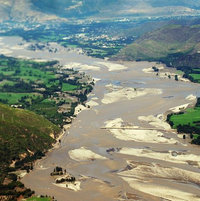
This is Part III in a four-part series. Part I examined the follow-up agreement to the Kyoto Protocol. Part II examined the REDD+ agreement. Part III examines financial assistance. And Part IV will examine technology transfers and adaptation. CANCÚN, Mexico — The great paradox confronting international climate change talks like December’s Cancún conference is simple: The countries who have contributed least to global emissions of greenhouse gases will bear the greatest brunt of the changing weather patterns that result from them. Conference participants and observers agree that the solution is also simple: Those who have polluted the most should fix […]
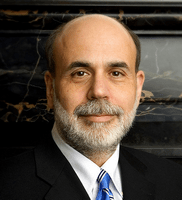
Late last month, the Federal Reserve announced that it was authorizing the extension of temporary credit lines, or “currency swaps,” with major foreign central banks through August. While five economies are included in the extension, it is the Fed’s credit line to the European Central Bank (ECB) that is the most significant in light of Europe’s continued debt woes. The decision to extend the currency swaps, which were initially scheduled to expire in January, suggests that the Fed isn’t counting on 2011 to be free of international financial distress, and that it remains prepared to throw its resources behind any […]
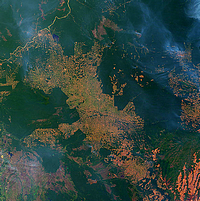
This is Part II in a four-part series. Part I examined the follow-up agreement to the Kyoto Protocol. Part II examines the REDD+ agreement. Part III will examine financial assistance. And Part IV will examine technology transfers and adaptation. CANCÚN, Mexico — Amid all the discussion of global warming and how the international community can deal with it, the term “REDD +” was a particular focus of attention at December’s Cancún conference on climate change. The initiative stands out as the newest, but perhaps the least-tested and least-understood method to reduce global carbon emissions and abate rising temperatures. If the […]
